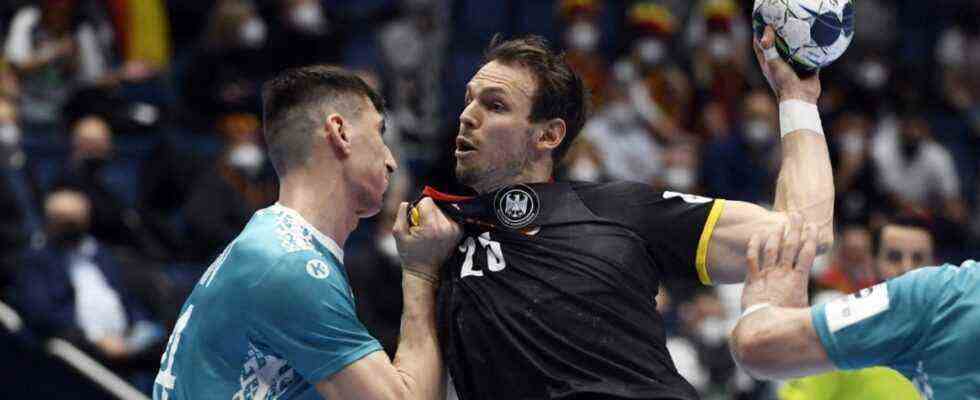Fearless is the adjective that best describes Kai Häfner’s handball game. In the safe expectation that various defensive arms will be pelted down on him, causing terrible pain, the left-hander squeezes through even the smallest of gaps. The photographers always take nice pictures when Häfner rushes forward, although two defenders are in his arms, but he keeps on pulling, another meter, a bit.
It hurts, but it’s valuable: At the end of his slalom run through the defensive confusion, Häfner either shook off both opponents and let the ball hiss on goal. Or his neighbor is so free that he only has to pass the ball over.
“Kai was outstanding”, said national coach Gislason about his player Häfner.
(Photo: Marijan Murat/dpa)
In the German team’s first game at this European Championship in Hungary and Slovakia, Häfner cleared pretty much everything there was to get. First he was voted the best player of the game in Bratislava after his eight goals in the 33:29 (17:18) in the opening match against Belarus. He received special praise from the national coach for this – and then he also managed the best saying of all.
You have to know: Häfner, European champion of 2016, is an experienced player at the European Championships in the midst of a newly formed German team, some of which are very young. It’s hard to predict what’s possible in terms of sport this time. “We didn’t know where we were,” said Häfner after the win against Belarus: “And if I’m honest, I don’t really know after this game either.”
“That was the best game I’ve ever seen from him,” said national coach Gislason
In the event of a defeat at the start, the pressure on the German team would have been considerable, so the relief was palpable. “We are all the happier. The win is good for us and gives us a positive feeling,” said Häfner after this complicated opening game in which the German Handball Federation (DHB) team initially had to chase a five-goal deficit and needed it until well into the second half , to make a decisive difference.
It was Häfner who, even in the trickiest minutes, made excellent allusions to the circle, tore important holes for his colleagues and scored again and again himself, eight times, just as often as his colleague on the left wing, Marcel Schiller. “In my opinion, Kai played absolutely outstandingly,” praised national coach Alfred Gislason: “That was probably the best game I’ve ever seen from him – and I’ve seen quite a few games.” Häfner concealed the fact that some other things weren’t going so well: the goalkeepers saved little or nothing, and the defense had considerable problems getting a grip on the Belarusian pivot Artsem Karalek. Far too often the opponents scored easy goals from the outside.
In the national team, Häfner was often only second or third choice in the right backcourt – perhaps because he never played for a Champions League club, instead in Göppingen, Balingen and Hanover, now in Melsungen. But once before he represented the top dogs in his position: Six years ago, for the surprising European championship title, Häfner was nominated and had his best moment when he played the ball in the semi-finals in extra time against Norway seconds before the final siren to the decisive 34:33 thrown into the net. Two days later, in the final against Spain, he was the best scorer of the German team, which won the title, with seven goals.
Now, at the age of 32, Häfner is the second-oldest player in the squad and is guiding his colleagues more and more clearly. Against Belarus it was the experienced players like Häfner, Schiller (30), middleman Philipp Weber (29) or backcourt shooter Julius Kühn (28) who turned the game around in the second half. All the more bitter the news that that Kühn fails for the time being. The news came on Saturday evening that he had tested positive for Corona. The DHB announced that he was symptom-free and going into isolation. There were initially no other corona cases to report, so Kühn is out of the preliminary round, but could leave the quarantine again after five days if the tests were negative – i.e. for the main round if Germany qualifies.
The team needs him, that’s for sure, because against Belarus Gislason either didn’t bring the many young but inexperienced players in the squad at all or only sporadically; as if he didn’t want to subject Julian Köster and Co. to a tough test right at the start against such an opponent. The Häfner-Weber-Kühn axis worked well, as it did in the preparation for the surprising success over Olympic champion France.
In the second game against Austria (Sunday, 6 p.m., ARD) it is now a matter of doing some things better and taking a big step towards the main round, whereby: What should someone like Kai Häfner do better? Tear more holes? Hardly possible. Take more pain? Please do not! He should just go ahead and pull his colleagues along. Fearless, of course.

